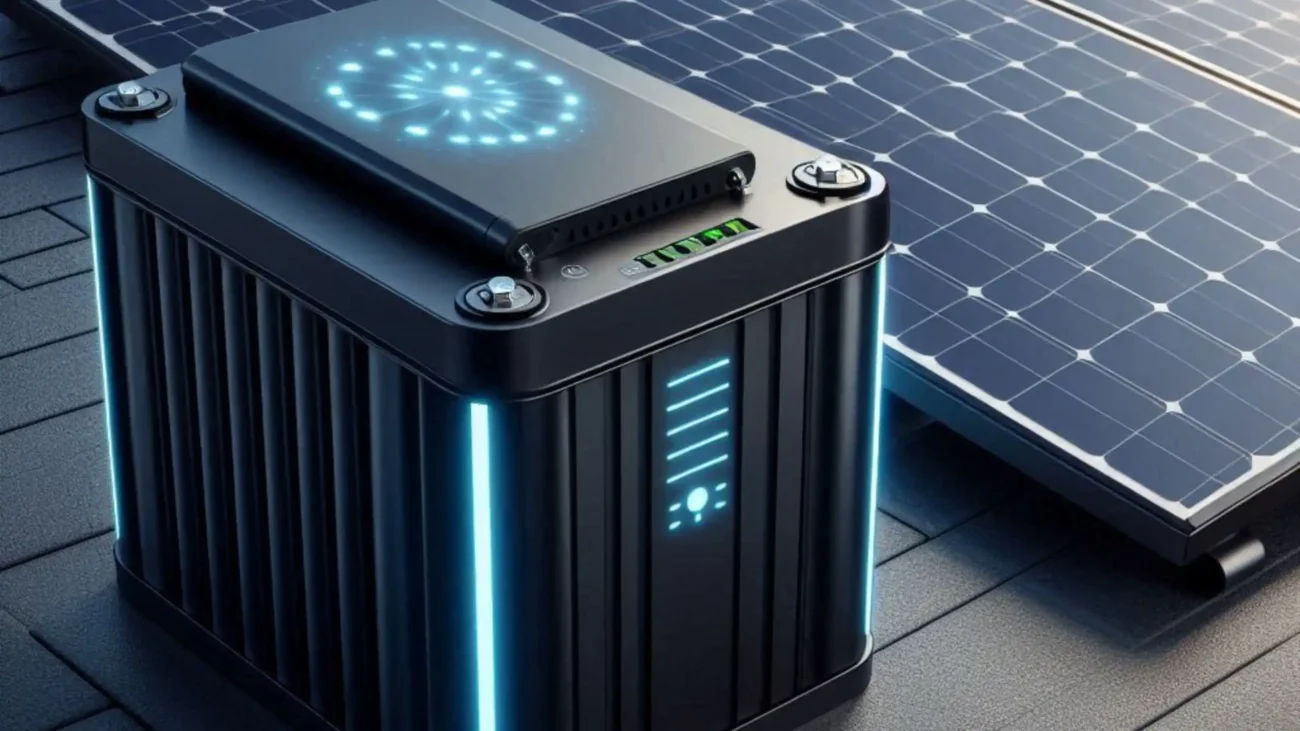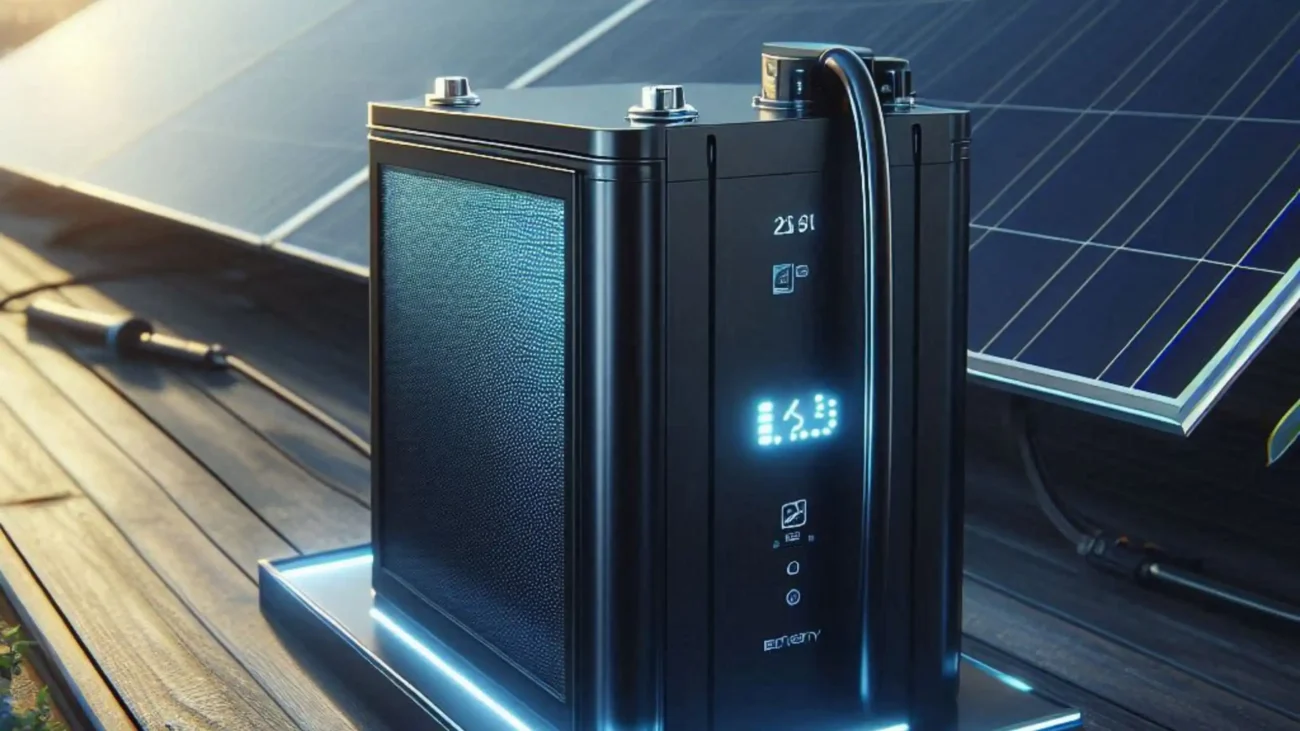As the world pivots towards renewable energy, the integration of solar power systems has seen a significant rise. A critical component of any solar power setup is the lithium-ion battery, which ensures efficient energy storage and utilization. Choosing the best lithium-ion battery for your solar needs is paramount to maximizing the efficiency and longevity of your solar power system. This article delves into the top contenders in the market, providing a comprehensive guide to help you make an informed decision. Solar Gadget
In This Post
Why Choose Lithium-Ion Batteries for Solar?
Lithium-ion batteries have become the preferred choice for solar energy storage due to their high energy density, long lifespan, and superior efficiency. These batteries offer several advantages over traditional lead-acid batteries, including:
- Higher Depth of Discharge (DoD): Lithium-ion batteries can be discharged up to 80-90% of their capacity without damaging their lifespan, compared to lead-acid batteries which typically allow only 50%.
- Longer Lifespan: With proper maintenance, lithium-ion batteries can last up to 10 years or more, whereas lead-acid batteries usually last 3-5 years. Solar Gadget Reviews
- Lightweight and Compact: They are lighter and more compact, making installation easier and requiring less space.
- Low Maintenance: Lithium-ion batteries require less maintenance than lead-acid batteries, which need regular water refilling and equalization charges.

Key Factors to Consider When Choosing a Lithium-Ion Battery for Solar
When selecting the best lithium-ion battery for your solar setup, it is essential to consider the following factors:
Battery Capacity and Power Output
Capacity, measured in kilowatt-hours (kWh), indicates the amount of energy the battery can store. It is crucial to choose a battery with enough capacity to meet your daily energy needs. Power output, measured in kilowatts (kW), determines how much power the battery can deliver at a given time. Ensure that the battery can handle your peak energy demands.
Depth of Discharge (DoD)
The DoD is the percentage of the battery that can be discharged relative to its total capacity. Higher DoD means you can use more of the battery’s capacity. For instance, a battery with a 90% DoD allows you to use 90% of its stored energy before needing a recharge. Blog
Round-Trip Efficiency
Round-trip efficiency measures how effectively a battery can store and release energy. A higher round-trip efficiency indicates less energy loss during the charging and discharging process. Look for batteries with round-trip efficiencies above 90%.
Lifespan and Warranty
The lifespan of a lithium-ion battery is typically measured in cycles, where one cycle represents a full charge and discharge. A longer lifespan means fewer replacements and lower long-term costs. Warranty terms provide a safety net against premature failures and defects.
Cost
While lithium-ion batteries are more expensive upfront than lead-acid batteries, their long-term benefits often justify the investment. Consider the total cost of ownership, including the initial purchase price, maintenance costs, and lifespan. Solar Guides
Top Lithium-Ion Batteries for Solar in 2024
1. Tesla Powerwall 2
The Tesla Powerwall 2 is a leading choice for residential solar energy storage. It offers:
- Capacity: 13.5 kWh
- Power Output: 5 kW continuous, 7 kW peak
- Depth of Discharge: 100%
- Round-Trip Efficiency: 90%
- Warranty: 10 years
The Powerwall 2’s high capacity and seamless integration with Tesla’s solar products make it an excellent option for homeowners looking to maximize their solar investment.

2. LG Chem RESU
The LG Chem RESU series is renowned for its reliability and performance. Key features include:
- Capacity: 9.8 kWh
- Power Output: 5 kW
- Depth of Discharge: 90%
- Round-Trip Efficiency: 95%
- Warranty: 10 years
LG Chem’s compact design and high efficiency make it a popular choice among residential and commercial users. Gadget For Travelers
3. Sonnen Eco
The Sonnen Eco offers robust performance with advanced energy management capabilities:
- Capacity: 10 kWh
- Power Output: 3.3 kW continuous
- Depth of Discharge: 100%
- Round-Trip Efficiency: 90%
- Warranty: 10 years
The Sonnen Eco’s smart energy management system optimizes energy use, providing significant savings and increased efficiency.
4. BYD Battery-Box Premium
BYD’s Battery-Box Premium is a scalable solution ideal for various applications:
- Capacity: 8.3 kWh (scalable up to 66.2 kWh)
- Power Output: 5 kW
- Depth of Discharge: 100%
- Round-Trip Efficiency: 96%
- Warranty: 10 years
Its modular design allows for easy expansion, making it suitable for both small and large-scale solar installations.
5. Pylontech US2000B Plus
The Pylontech US2000B Plus is a cost-effective, high-performance option:
- Capacity: 2.4 kWh (scalable)
- Power Output: 2.4 kW
- Depth of Discharge: 90%
- Round-Trip Efficiency: 95%
- Warranty: 10 years
Pylontech’s affordability and scalability make it a versatile choice for various solar applications.

Conclusion
Choosing the right lithium-ion battery for your solar system is crucial for optimizing energy storage and ensuring long-term reliability. The Tesla Powerwall 2, LG Chem RESU, Sonnen Eco, BYD Battery-Box Premium, and Pylontech US2000B Plus are among the best options available, each offering unique advantages to suit different needs and budgets.
When selecting a battery, consider factors such as capacity, power output, depth of discharge, round-trip efficiency, lifespan, and cost. By making an informed decision, you can maximize the benefits of your solar power system, reduce your reliance on the grid, and contribute to a more sustainable future.
FAQs on the Best Lithium-Ion Battery for Solar
What is the lifespan of a lithium-ion battery for solar systems?
The lifespan of a lithium-ion battery for solar systems typically ranges from 10 to 15 years. Factors affecting longevity include usage patterns, maintenance, and environmental conditions. Most high-quality lithium-ion batteries come with warranties of around 10 years, ensuring reliable performance over their lifespan.
How does depth of discharge (DoD) affect the performance of a lithium-ion battery?
Depth of Discharge (DoD) affects the performance and lifespan of a lithium-ion battery by determining how much of the battery’s capacity is used. Higher DoD means more capacity is utilized per cycle, but frequent deep discharges can shorten the battery’s lifespan. Optimal DoD balances usable capacity and longevity.
What is round-trip efficiency, and why is it important?
Round-trip efficiency measures the percentage of energy retained after a complete charge and discharge cycle. It is important because higher efficiency means less energy loss, leading to more effective energy storage and usage. For solar systems, high round-trip efficiency ensures maximum utilization of generated solar power.
How do I determine the right capacity for my lithium-ion battery?
To determine the right capacity for your lithium-ion battery, calculate your daily energy consumption in kilowatt-hours (kWh) and consider the number of backup days needed. Multiply daily consumption by the desired backup days. For example, if your daily use is 10 kWh and you need 2 days of backup, you’ll need a battery with at least 20 kWh capacity.
Are lithium-ion batteries safe for residential use?
Yes, lithium-ion batteries are safe for residential use. They include advanced safety features like thermal management systems, overcharge protection, and built-in monitoring to prevent overheating and overcharging. Proper installation and maintenance further ensure their safety and reliability in home environments.
Can lithium-ion batteries be recycled?
Yes, lithium-ion batteries can be recycled. Specialized recycling facilities can extract valuable materials like lithium, cobalt, and nickel for reuse. Many manufacturers also offer recycling programs, making lithium-ion batteries an environmentally friendly option.
What maintenance is required for lithium-ion batteries?
Lithium-ion batteries require minimal maintenance. Key tasks include:
Keeping them in a temperature-controlled environment.
Regularly monitoring the state of charge.
Ensuring connections are clean and secure.
Periodically updating battery management system (BMS) firmware if applicable.
How do lithium-ion batteries compare to lead-acid batteries in solar applications?
Lithium-ion batteries outperform lead-acid batteries in solar applications with higher energy density, longer lifespan, lighter weight, and lower maintenance. They offer better Depth of Discharge (DoD) and round-trip efficiency. Despite a higher upfront cost, lithium-ion batteries provide greater long-term value and reliability.
What is the cost difference between lithium-ion and lead-acid batteries?
Lithium-ion batteries generally have a higher upfront cost compared to lead-acid batteries. However, they offer longer lifespan, higher efficiency, and lower maintenance costs over time. The initial investment in lithium-ion batteries is often justified by their superior performance and durability in solar applications.
How do I install a lithium-ion battery in my solar system?
To install a lithium-ion battery in your solar system:
Consultation: Engage a qualified technician or installer for a site assessment and consultation.
Compatibility Check: Ensure the battery is compatible with your existing solar panels and inverter.
Installation: Connect the battery to the solar system, following manufacturer guidelines and local electrical codes.
Configuration: Set up the battery management system (BMS) and integrate it with your solar inverter for seamless operation.
Testing: Conduct thorough testing to verify proper functionality and safety measures.
Maintenance: Establish a regular maintenance schedule to monitor performance and ensure longevity.
Can I expand my lithium-ion battery storage in the future?
Yes, many lithium-ion batteries are designed to be modular, allowing for future expansion of storage capacity. You can typically add more battery units to increase storage as your energy needs grow. Ensure compatibility with existing components and consult with a qualified technician for proper installation and configuration.
What are some top brands of lithium-ion batteries for solar systems?
Some top brands of lithium-ion batteries for solar systems include:
Tesla (Powerwall series)
LG Chem (RESU series)
Sonnen (Eco series)
BYD (Battery-Box Premium)
Pylontech (US2000B Plus)
These brands are known for their reliability, performance, and compatibility with solar energy systems, offering a range of options to meet different needs and budgets.
How do temperature variations affect lithium-ion battery performance?
Temperature variations can significantly impact lithium-ion battery performance:
Cold Temperatures: Decrease battery efficiency and capacity, potentially leading to reduced power output and slower charging.
Hot Temperatures: Accelerate battery degradation, shortening lifespan and potentially causing safety issues like overheating.
Maintaining batteries within optimal temperature ranges (typically 20-25°C or 68-77°F) ensures best performance and longevity.
What is the environmental impact of using lithium-ion batteries for solar?
Using lithium-ion batteries for solar energy storage has a positive environmental impact overall:
Reduced Carbon Emissions: By storing solar energy efficiently, lithium-ion batteries help reduce reliance on fossil fuels for electricity generation.
Resource Conservation: They promote the use of renewable energy sources and reduce the need for non-renewable resources.
Recycling Potential: Many lithium-ion batteries can be recycled, recovering valuable materials like lithium and cobalt, minimizing waste.
Their high efficiency and long lifespan contribute to a lower overall environmental footprint compared to conventional energy storage methods.
Are there any government incentives for installing lithium-ion batteries for solar systems?
Many governments offer incentives, rebates, and tax credits for installing solar systems with energy storage. Check with your local and federal authorities to see what incentives are available in your area.
